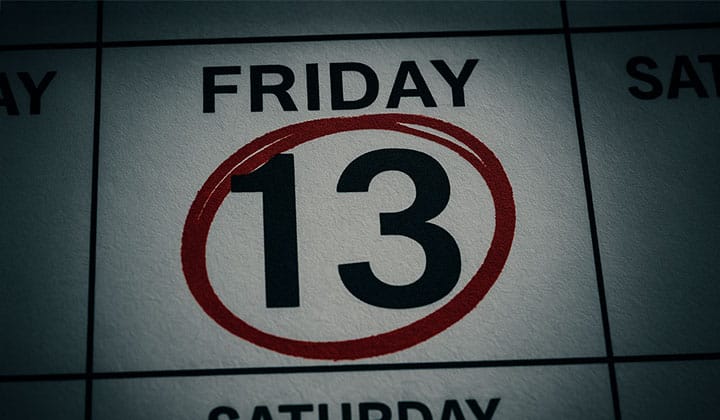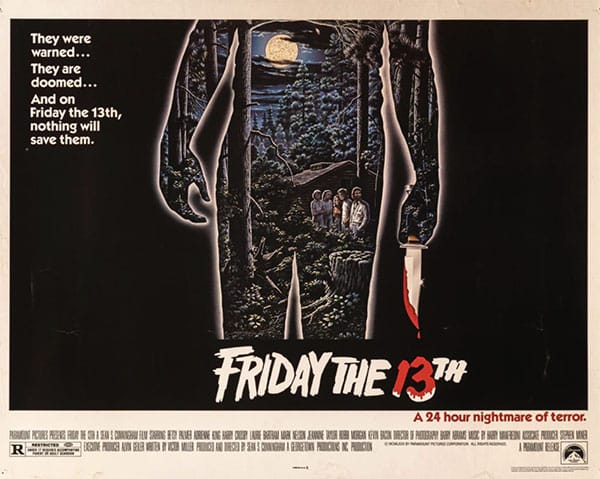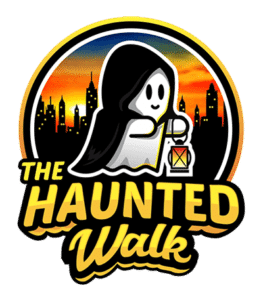
At The Haunted Walk, we always get a little thrill when we see a Friday the 13th pop up on the calendar. There’s something extra spine-tingling about leading tours on a night so drenched in superstition. But why has this seemingly random date become such a cultural lightning rod for fear? And is there any real evidence that it’s actually unlucky? (Check out our podcast on curses for more hexing fun!)
A Superstitious Pairing
While both “Friday” and the number “13” have long carried ominous reputations on their own, the combination of the two is surprisingly modern. The phrase “Friday the 13th” doesn’t appear in written records until the 19th century.
Some of the fear surrounding the number 13 may stem from Christianity. At the Last Supper, Jesus dined with his 12 disciples, making 13 at the table, and it is traditionally believed that Jesus was crucified on a Friday. Over time, both the day and the number took on a dark, unlucky aura. When combined, they became a symbolic double-dose of bad luck.
Similar patterns appear in Norse mythology. One story tells of a dinner party in Valhalla attended by 12 gods. Loki, the trickster god, crashed the party as the uninvited 13th guest. His arrival led to chaos and the death of the beloved god Balder. Whether rooted in myth or faith, it seems gatherings of 13 have long made people uneasy.
Some even point to a real historical event that adds to the date’s ominous reputation. On Friday, October 13, 1307, King Philip IV of France ordered the mass arrest of the Knights Templar, accusing them of heresy and other crimes. Many were tortured or executed, and the once-powerful religious order was brought to ruin. While this link to Friday the 13th didn’t enter popular culture until centuries later, it has become a favourite of conspiracy theorists and historical thrillers alike.
From Folklore to Pop Culture Phenomenon
It didn’t take long for Friday the 13th to creep into literature and film. One early example is Thomas W. Lawson’s 1907 novel, Friday, the Thirteenth, where a manipulative stockbroker uses superstition to crash the market.
But let’s be honest, Jason Voorhees is the one who truly turned the date into a pop culture juggernaut. The Friday the 13th film franchise has made nearly a billion dollars in box office revenue when adjusted for inflation. Jason’s hockey mask, machete, and murderous visits to the unlucky campers at Crystal Lake have turned the date into something of a horror holiday.
This creates a bit of a chicken-and-egg question. Are we afraid of the curse because it’s real, or because we’ve been taught to be afraid of it?

Fear by the Numbers
For something we can’t see or measure, the fear of Friday the 13th has very real consequences.
Donald Dossey, a folklorist and founder of the Stress Management Center and Phobia Institute in North Carolina, coined the term paraskevidekatriaphobia, which refers to the fear of Friday the 13th. He estimates that between 17 and 21 million Americans are affected by it. That is enough people to noticeably slow the economy each time the date appears, as many avoid flying, reschedule meetings, or simply choose to stay home and play it safe. If we apply those numbers to Canada, that would mean more than 3 million Canadians might be cautiously keeping their plans on hold.
The fear runs so deep, it has even shaped the way buildings are constructed. Many hotels, office towers, and high-rises skip the 13th floor, jumping straight from 12 to 14. Elevator panels are built without a 13th button, not because the floor doesn’t exist, but because the number makes people uncomfortable.
Why does this superstition stick so strongly? One reason may be confirmation bias, which is the tendency to notice and remember information that supports what we already believe. If something bad happens on a regular Friday, we tend to shrug it off. But if something goes wrong on Friday the 13th, we are much more likely to remember it and use it as proof that the date is cursed. Over time, those stories stack up and create the illusion of a pattern.
Some statistics have added to the myth, even when they shouldn’t. A 1993 study published in the British Medical Journal reported that hospital admissions due to traffic accidents increased by 52 percent on Friday the 13th compared to other Fridays. It sounds ominous, but here’s the twist: the study appeared in the Journal’s annual Christmas edition, which is known for including humorous or satirical content. It was likely intended more as a playful curiosity than serious science.
More rigorous studies paint a different picture. Igor Radun, of the Human Factors and Safety Behaviour Group at the University of Helsinki, points out that most research about Friday the 13th focuses on surface-level data such as accident rates or stock fluctuations. These studies rarely examine whether belief in the superstition actually influences people’s behaviour. In his own work, Radun found no meaningful increase in injury-related road accidents on Friday the 13th compared to the Fridays before or after.
A Surprisingly Safe Day?
In fact, some data suggests Friday the 13th may be safer than the average Friday.
A 2008 study by the Dutch Centre for Insurance Statistics found there were fewer traffic accidents, fires, and thefts on Friday the 13th than on other Fridays. They suggested this might be because people behave more cautiously on the date, avoiding unnecessary risks and staying alert.
One eerie detail stood out, though. While fewer incidents occurred overall, the average monetary value of the losses was slightly higher. So there may be fewer disasters, but when they happen, they tend to be a little more expensive.
Final Thoughts
Whether you scoff at superstitions or cross your fingers just in case, Friday the 13th continues to haunt the imagination. Maybe it’s not the day that’s dangerous, but the stories we tell about it.
This Friday the 13th, why not lean into the thrill and join us for a ghost tour in Toronto, Ottawa, or Kingston? After all, fear is always more fun with friends.
